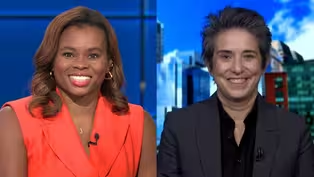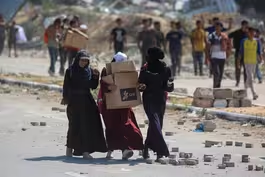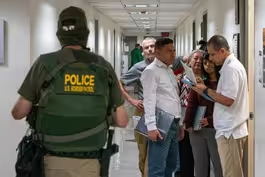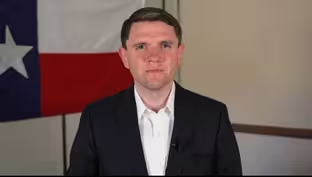
Gates Foundation pledges $2.5B for women’s health worldwide
Clip: 8/4/2025 | 6m 58sVideo has Closed Captions
Gates Foundation pledges $2.5B for women’s health worldwide
The Gates Foundation has announced a new $2.5 billion pledge through 2030 for women’s health initiatives worldwide. It comes at a time when the Trump administration is cutting major research and aid directed at women and maternal health. Amna Nawaz discussed the goals of this new funding with Dr. Anita Zaidi, president of the Gates Foundation's Gender Equality division.
Problems playing video? | Closed Captioning Feedback
Problems playing video? | Closed Captioning Feedback
Major corporate funding for the PBS News Hour is provided by BDO, BNSF, Consumer Cellular, American Cruise Lines, and Raymond James. Funding for the PBS NewsHour Weekend is provided by...

Gates Foundation pledges $2.5B for women’s health worldwide
Clip: 8/4/2025 | 6m 58sVideo has Closed Captions
The Gates Foundation has announced a new $2.5 billion pledge through 2030 for women’s health initiatives worldwide. It comes at a time when the Trump administration is cutting major research and aid directed at women and maternal health. Amna Nawaz discussed the goals of this new funding with Dr. Anita Zaidi, president of the Gates Foundation's Gender Equality division.
Problems playing video? | Closed Captioning Feedback
How to Watch PBS News Hour
PBS News Hour is available to stream on pbs.org and the free PBS App, available on iPhone, Apple TV, Android TV, Android smartphones, Amazon Fire TV, Amazon Fire Tablet, Roku, Samsung Smart TV, and Vizio.
Providing Support for PBS.org
Learn Moreabout PBS online sponsorshipGEOFF BENNETT: The Gates Foundation announced# a new $2.5 billion pledge through the year 2030## for women's health initiatives across the# globe.
It comes at a time when the Trump## administration is cutting major research and# aid directed at women and maternal health.
Amna Nawaz spoke recently with the point# person about the goals of this new funding.
AMNA NAWAZ: Dr. Anita Zaidi is president of the## Gates Foundation's Gender Equality# Division, and she joins me now.
Dr. Zaidi, welcome to the "News# Hour."
Thanks for joining us.
DR. ANITA ZAIDI, Gender Equality Division,# Gates Foundation: Thank you, Amna.## Thank you for having me.
AMNA NAWAZ: So thi.. of $2.5 billion for women's health over the# next five years is focused on five areas.
I will tick through them quickly here, obstetric## care to make pregnancy and delivery# safer, maternal health and nutrition,## gynecological and menstrual health, more# accessible and effective contraceptive options,## and better diagnosis and treatment of# STIs, or sexually transmitted infections.
So why these five priorities?# What's the overarching goal here?
DR. ANITA ZAIDI: So, Amna, this is --# when we looked at all of the data that is## there for women's health and what it is that# causes a lot of problems around the world,## these were the areas that# had three things in common.
One is, they are a huge burden and unmet# need.
Two is that they are very neglected## from an R&D perspective.
And three is that# low-cost, affordable innovations that can## be available in the near-term horizon# are possible for many of these issues.
AMNA NAWAZ: You said also these are going# to particularly affect women in low and## middle-income countries.
We should point out your# background was in pediatric care in Pakistan.
Can you just give us an example of the# kinds of things that you would see that## tells you these investments make a real# difference?
Give us one or two stories.
DR. ANITA ZAIDI: Yes.
So how often, for example, women#don't get Caesarean sections in time## because we don't have the right tools to# diagnose when she needs a Caesarean section,## or unnecessary Caesarean sections# are done because we guess wrong.## And that's a problem actually that# women face all around the world.
But I used to see this all the time, that a# Caesarean section was delayed because you did## not know that this woman actually needed# to be in a hospital that was far away.
And so one of the things I think which would be# the most transformative and which we will see come## out sooner, in the next five years, is going to# be what we can do with artificial intelligence to## be able to really understand when a woman really# needs a Caesarean section for a safe delivery.
AMNA NAWAZ: We should point out too these are# areas that have long been underfunded.
There## was a 2021 study that found just 1 percent of# health care research and innovation is invested## in female-specific conditions outside of# oncology, just 1 percent.
Why is that?
DR. ANITA ZAIDI: Yes, so that's# a really good question, Amna.
It's -- there's several reasons.# There is a systemic issue, structural,## in medicine where the male body has been# the default body.
And so the assumption is## that whatever works for men also works# for women.
But there are fundamental## biological differences between men and# women that need different solutions.
And two is that many areas such as pregnancy# are considered very high risk for research.## And so often the thing has been you leave# pregnant women out of a lot of clinical## trials.
And what that has resulted in is# the situation where we actually now don't## have medicines that we can use if a# pregnant woman develops a problem.
A very big example of this,# which is a problem that women,## pregnant women, face around the world# is preeclampsia, which is hypertension## during pregnancy.
Preeclampsia has no# treatment anywhere around the world.
AMNA NAWAZ: There's also been reports that# look at how the money invested in women's## health pays dividends more broadly in society.# Is this just about investing in women's health?
DR. ANITA ZAIDI: Well, so when you work in# low-resource environments like I have worked, you## very quickly see the connection between women's# health, children's health, and family health.
And so I would say one of the most profound# lessons I learned by working in communities## is how children cannot thrive where women are# not thriving.
And those things are extremely## closely related.
And, in fact, if we want to# decrease child mortality around the world,## you really need to focus on women's health.
AMNA NAWAZ: We're also speaking at a time when you# have seen the U.S. government pull back from a lot## of foreign aid funding it was doing, dismantling# health programs right here in the U.S. and making## it harder, a lot of people argue, to access things# like family planning and maternal health care.
How much did all of that inform# this investment right now?
DR. ANITA ZAIDI: So they're not connected.
I would call this investment a foundational# pillar of the Gender Equal.. the Gates Foundation.
And I'm just really# proud to be able to share this commitment.## It's the largest commitment that# the foundation has ever made to## any particular area of R&D.
And we chose# the five years for a good reason as well.
One is that I think that this is# a unique opportunity to accelerate## progress for women's health, because# so many A.I.
has made so much faster## progress possible.
And two is that it's# a short enough time that I want to hold## myself accountable to be able to deliver# on the promise.
So that's the five years.
No foundation or groups of foundations can## match the funding that the U.S. government has# historically provided for fighting disease,## hunger, and poverty around the world.# And our hope is that this investment## can catalyze attention and interest from# the private sector and from philanthropy.
AMNA NAWAZ: You have called this# $2.5 billion just a drop in the## bucket.
To meet the need that's# out there, what needs to happen?
DR. ANITA ZAIDI: Yes, so it seems like# a big number.
And it is a big number,## $2.5 billion for the next five years# for women's health innovations.
But for what the need is, it's a drop.
It really# is a drop in the bucket.
And we really are## hoping that this is the -- this announcement# sparks interest from a lot of other funders,## innovators, private philanthropy, private sector## to come in and see that this is not just# the right thing to do, but there's a## tremendous opportunity for coming up with new# solutions in a very exciting area of science.
AMNA NAWAZ: That is Dr. Anita Zaidi, the president## of the Gates Foundation's# Gender Equality Division.
Dr. Zaidi, thank you.
Such a# pleasure to speak with you.
DR. ANITA ZAIDI: Same here.# Thank you so much, Amna.
Amy Walter and Jasmine Wright on trust in institutions
Video has Closed Captions
Clip: 8/4/2025 | 8m 58s | Amy Walter and Jasmine Wright on Trump's BLS firing and trust in institutions (8m 58s)
Beirut blast victims struggle as leaders evade blame
Video has Closed Captions
Clip: 8/4/2025 | 7m 35s | 5 years after Beirut blast, victims struggle to rebuild lives as leaders evade blame (7m 35s)
Ex-Trump official: BLS firing undermines trust in key data
Video has Closed Captions
Clip: 8/4/2025 | 8m 41s | Firing of labor statistics head undermines trust in key data, ex-Trump official warns (8m 41s)
News Wrap: 40 Gazans killed by Israeli gunfire, airstrikes
Video has Closed Captions
Clip: 8/4/2025 | 4m 51s | News Wrap: At least 40 Gazans killed by Israeli gunfire and airstrikes (4m 51s)
Priest says ICE targets migrants at immigration court
Video has Closed Captions
Clip: 8/4/2025 | 6m 48s | Jesuit priest describes seeing ICE agents target migrants at immigration court (6m 48s)
Texas Democrats leave state to stop GOP redistricting plan
Video has Closed Captions
Clip: 8/4/2025 | 3m 28s | Texas Democrats leave state to stop GOP's redistricting plan backed by Trump (3m 28s)
Trump is trying to 'insulate himself,' Texas Democrat says
Video has Closed Captions
Clip: 8/4/2025 | 5m 7s | Trump trying to 'insulate himself from the will of the public,' Texas Democrat says (5m 7s)
Providing Support for PBS.org
Learn Moreabout PBS online sponsorshipSupport for PBS provided by:
Major corporate funding for the PBS News Hour is provided by BDO, BNSF, Consumer Cellular, American Cruise Lines, and Raymond James. Funding for the PBS NewsHour Weekend is provided by...


















